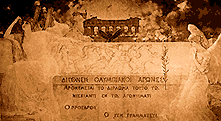Olympics Through Time
Prehistory of the Olympic Games
But before the Olympic games became a recurring Panhellenic festival, athletic
competitions had different meanings for various cultures of the Mediterranean.
Archaeological evidence proves that ancient Egyptians held athletic competitions
and in the Minoan and in the Mycenean cultures athletic competitions were
an important component of religious and funerary ceremonies.

The Olympic festival during Antiquity
Modern research focuses on understanding the organization of this great religious
celebration held at Olympia, that became a symbol of political and cultural
unity for all Greeks in Antiquity. The sanctuary of Olympia imposed its authority
throughout the Greek world and the Olympic Games became the symbol of Panhellenic
unity. In the Hellenistic and the Roman periods the athletic spirit changed
and the Olympic festival became an international institution.

Revival of the Ancient Olympics
The rebirth of the Olympic Games during the 19th century started long before
1896, when the modern Greek state was established. These first attempts by
A. Soutsos and E. Zappas and great efforts later on by other Greeks and Europeans
helped the revival of the Olympic Games become a reality in Athens of 1896.

